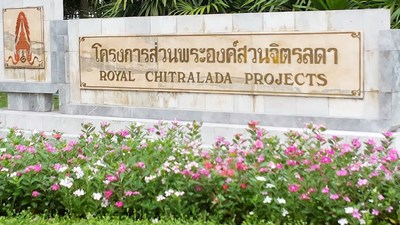
BANGKOK, Thailand, Sept. 15, 2017 /PRNewswire/ -- Ministry of Foreign Affairs of Thailand reveals the history of the Chitralada Royal Villa. Mention the term "royal villa" and most people imagine grandeur and splendor, yet this does not quite fit Chitralada Royal Villa.

While Chitralada Royal Villa served as the unofficial permanent residence of the late King Bhumibol Adulyadej and Her Majesty Queen Sirikit, it has evolved into much more.
When King Bhumibol took the throne in 1946, nearly all of Thailand's population was working in the agricultural sector and the best way to improve Thais livelihoods was to help them reap greater harvests.
In the mid 80s, things started to change for Thailand. Thailand experienced nearly double-digit economic growth for eleven years thanks to its embrace of industrialization. This rapid growth benefits many Thai people who migrated from agriculture to industrial work. However, life for the common farmer became more challenging as the income disparity gap widened along with the negative impacts upon the environment.
As Thailand started to become a more diverse economy, His Majesty the late King also started to diversify the research conducted at Chitralada Royal Villa. Scientists started to look for new innovations in agriculture in more developed countries and research whether they could be applied in Thailand.
The sprawling grounds of Chitralada Royal Villa now house a wide variety of facilities, which all cater towards the agricultural industry, either in raw product or byproduct: rice fields, fish ponds, a dairy farm, gasohol processing center, an organic fertilizer factory, and numerous other centers have been set up for research.
New agricultural fields
One of the first projects undertaken at Chitralada Royal Villa was the creation of fish ponds, to provide a replenishable supply of protein for Thai farmers. In 1952 His Majesty the late King started experimenting with Tilapia mossambica. The quick growth and low maintenance of the species made it ideal and they were later given to every village head and district chief throughout the kingdom.
In 1965, the then Crown Prince of Japan, Crown Prince Akihito, presented twenty-five pairs of Tilapia nilotica to His Majesty. Due to their hardiness, and excellent growth rate, Tilapia nilotica has spread throughout the Kingdom and has become a common place cash fish.
Prior to the 1960s, Thailand did not have a dairy industry. King Bhumibol traveled to the Kingdom of Denmark in 1960 to meet King Frederick IX and to study the viability of establishing a milk industry in Thailand. Then in 1962 the royal collaboration led to establishing the Thai-Danish Dairy Farm and training center in Muak Lek, Saraburi, and brought dairy cows to Chitralada Royal Villa. The dairy farm allowed courtiers to drink milk on a regular basis. Since its initial opening, research has expanded beyond simple milk production and moved into pasteurization processes and making milk-based products such as powdered milk, cheese, and ice cream.
Alternative Fuels
Besides agricultural products, Chitralada Royal Villa also found the need to address Thailand's growing needs for energy, and to reduce its dependency on fossil fuels.
In 1985, efforts were put into the viability of producing alcohol from the abundant sugar cane crops. The Experimental Fuel Production Unit was then established from His Majesty the King's private funds. The process would later refine molasses, a waste byproduct of sugar production, into ethyl alcohol. Ethyl alcohol is a form of alcohol that can be mixed with benzene or gasoline to produce Gasohol.
Putting waste to use
Being a world leader in rice production means a lot of waste generated from the husks that surround the rice grain. The husks from the rice are flammable, and research was done on how to compress the husks into low-smoking briquettes to make charcoal. Besides helping to eliminate waste, these charcoal briquettes also reduced the need to cut down forest trees to make traditional charcoal.
Another byproduct of rice cultivation and processing is rice bran. Chitralada Royal Villa researchers worked with this byproduct, using it in the cultivation of many high-value mushroom species like ling zhi, monkey's head, and lion's mane fungi. This presents traditional rice farmers with a possible alternative crop.
In addition to agriculture, King Bhumibol founded the Chitralada School in 1958. Chitralada School was established to provide education to the royal family and also to children of the staff who worked in the palace. Since then the school has opened its enrollment to a broader range of students like other schools in Thailand.
The Chitralada Royal Villa could possibly be the most unique and diversified royal residence in the world, and the research that has been conducted there has brought about great benefits to all the people of Thailand.
Tel: +662-203-5000
Photo - http://mma.prnewswire.com/media/556170/Royal_Chitralada_Projects.jpg
